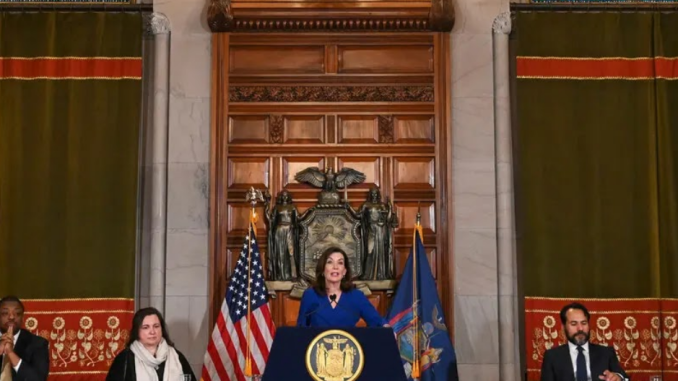
By Gabriela Flores
Reporting assistance by Matt Hirsch
After missing the state’s Apr. 1 deadline for a new fiscal year, Gov. Kathy Hochul announced this past Thursday that she reached a “conceptual agreement” with state lawmakers on their $220 billion executive budget, according to THE CITY. The budget grants $220 million for CUNY, with $53 million for hiring full-time faculty across senior and community colleges. Some advocates of the New Deal For CUNY, a plan that outlines how $1.7 billion in state funding can resolve several issues across the university, think this new budget is a step in the right direction.
“While some details remain uncertain, it’s clear this budget demonstrates a renewed understanding and appreciation of CUNY’s ability to uplift our communities, build futures, and power New York State’s economy,” said James Davis, the Professional Staff Congress chair, in a published statement. “It sets us on a course to a New Deal for CUNY, which we must follow for the sake of future generations of CUNY students.”
Though the budget falls short of the funding New Deal For CUNY calls for, and what many like Senator Andrew Gounardes demanded, some students and university members are hopeful of the new budget’s impacts.
“At least [in] my opinion, I think it should be directed to getting better classrooms for students, help getting online accreditation,” said Sophia Kieseheuer, chair of Pro-Student CUNY, an organization that addresses concerns regarding the university’s 70% in-person policy. “So you can receive diplomas online because that costs money – hiring more professors that are internet savvy or hiring somebody that can train professors on how to use Blackboard, and how to do all that stuff.”
The executive budget also allocates $40 million for CUNY to better academic programs, increase enrollment, and other academic milestones. For part-time students receiving Tuition Assistance Program funds at CUNY and SUNY, the budget is providing $150 million to expand part-time TAP. Negotiations about the final budget remain ongoing among state lawmakers as of press time.
